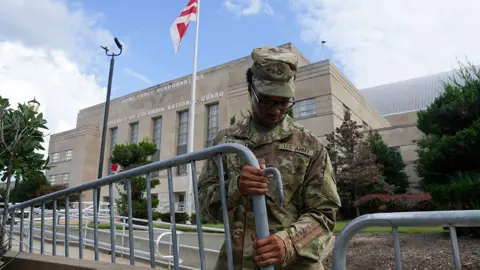In a significant escalatory move, National Guard troops have recently been deployed throughout Washington D.C. This decision was initiated by President Donald Trump, who cited rising violent crime as the catalyst for the military presence in the nation’s capital. This action has evoked a controversial response from local government officials, particularly the city’s mayor, Muriel Bowser, who has firmly opposed what she terms an “authoritarian push” by the federal administration.
On a Tuesday evening, armored vehicles could be spotted stationed near urban centers and popular tourist destinations across D.C. Reports indicate that the deployment will include approximately 800 National Guard personnel alongside 500 federal law enforcement agents as part of a broader strategy to address concerns over crime rates. Mayor Bowser, a member of the Democratic Party, has consistently repudiated the narrative suggesting that crime in her city has spiraled out of control.
The military presence in the city was visibly expanding as camouflaged troops began arriving since Trump’s announcement the previous Monday. The troops have reportedly been engaged in erecting barricades in front of various government buildings and have interacted with tourists visiting the historical D.C. sites. In a combined operation, 23 individuals were arrested by federal agents under charges that ranged from homicide to drug-related offenses, as confirmed by White House press secretary Karoline Leavitt. She asserted that the federal agents were bolstering local law enforcement efforts.
Leavitt further emphasized that this action marks only “the beginning” of a broader campaign by the Trump administration to combat violent crime within D.C. She pledged that, in the weeks to come, efforts would intensify to apprehend criminals undermining public safety, thus securing the protection of law-abiding citizens in the area.
Interestingly, following the troop deployment announcement, another incident occurred in Logan Circle, a vibrant neighborhood just a mile from the White House, involving the shooting death of a male victim. This incident brought the year’s homicide count in Washington D.C. to a staggering 100, necessitating a renewed focus on security precautions, including the enhancement of protective measures around the presidential residence.
Despite assertions from local police and the mayor’s office that the goal of federal law enforcement aligns with their own—namely, enhancing safety and removing illegal firearms—Bowser used a town hall meeting to voice her discontent regarding Trump’s commands. She encouraged community action to safeguard the district’s autonomy and resist federal overreach, emphasizing the necessity of electing a Democratic majority in the House of Representatives to counteract what she describes as an authoritarian bid.
There is a contrasting landscape painted by statistics. Although D.C. Metropolitan Police data revealed a peak in violent crimes in 2023, leading to a reported 35% reduction in crimes last year—marking the lowest levels in over three decades—critics, including the D.C. Police Union, have accused police officials of intentionally misrepresenting data. Such allegations challenge the narratives around crime rates that might serve specific political ends.
Moreover, FBI data corroborates a trend of decreasing crime, although the drop stands at a more modest 9%. The capital’s homicide rate remains a point of contention, as studies suggest that this rate exceeds that of many other prominent U.S. cities, raising questions about the effectiveness of policing strategies and public safety in general.
In a snapshot of public sentiment amid these developments, it becomes clear that the deployment of military forces into the streets of Washington has broadly polarized opinion. This contention showcases the complex interplay of law enforcement, governance, and the ongoing struggle between federal authority and local autonomy, setting the stage for further debate as these issues evolve in the months to come.











